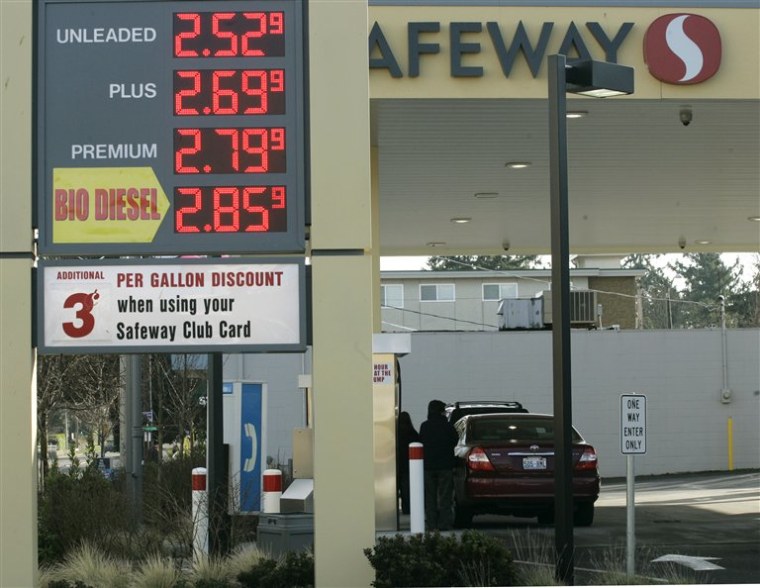Biodiesel is flowing from pumps at a Safeway Inc. gas station here, the first step in a test-marketing campaign that could spread the alternative fuel to more of the company's stores.
At a grand-opening ceremony Wednesday, Mayor Greg Nickels pumped about five gallons of the fuel — that'll be $15.36, please — into a biodiesel-burning Volkswagen Golf.
Nickels, who has made global warming a signature issue, said broader use of alternative fuels could help reduce the environmental effects of car exhaust.
"Together, we're going to prove there's a market for this," he said.
Biodiesel produces significantly fewer emissions of carbon dioxide, a key gas tied to warming, than gasoline.
Safeway, based in Pleasanton, Calif., has been selling the soybean oil fuel in Seattle for about a week. Customers began filling up as soon as it was available, without prompting or an advertising campaign, officials said.
The grocery store chain has about 270 gas stations in the U.S., offering discounts of up to 10 cents a gallon for shoppers who have a Safeway club card. Two more stations in the Seattle area could be the next targets for selling biodiesel.
Safeway's biodiesel is called B-20 — a blend of 20 percent soybean oil and 80 percent conventional diesel fuel. The distributor is Tacoma-based SC Fuels, which gets its soybean oil from the Iowa-based Renewable Energy Group.
The fuel blend can be used in most any vehicles with diesel engines with no special modifications needed, officials said.
Cherie Myers, a regional Safeway spokeswoman, said the company saw the environmentally conscious Northwest as a good place to test biodiesel's commercial viability.
"This was our first step. Now we're going to see how the consumer will respond to this," Myers said.
Safeway's foray into selling biodiesel comes as alternative vehicle fuels gain prominence across the country.
President Bush recently called for the use of 35 billion gallons of alternative fuels such as biodiesel and ethanol by 2017, a fivefold increase over current requirements.
Seattle-based Imperium Renewables Inc. is building an enormous biodiesel plant near Aberdeen. The refinery would produce an estimated 100 million gallons per year from imported raw materials.
Seattle Biodiesel, a subsidiary of Imperium, already operates the Northwest's first commercial refinery, producing 5 million gallons of biodiesel a year.
Safeway's move into selling alternative fuels could have a significant effect on the market if the program expands to more stations, SC Fuels Vice President Vince McBroom said.
"The demand is out there," he said. "But it's not widely available in a lot of areas."
